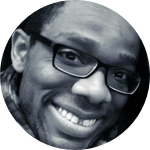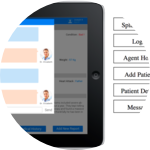About This Project
The US' rates of maternal and infant mortality rank amongst the worst among developed countries. Women die during childbirth for different reasons. There is no app that exists that shows a direct correlation of pain during pregnancy and death during childbirth. We have built an app that may be effective in monitoring pre and postpartum. With this project we will see if digital technology can show evidence in remote monitoring that can be used during pregnancy.
Ask the Scientists
Join The DiscussionWhat is the context of this research?
There is one health insurance paid pregnancy app in the US. Our platform has been developed to conduct a utilization- focused evaluation, administration, and providing patient engagement-based, data-driven, outcomes for reducing deaths during pregnancy, at and after childbirth.
We will collect patient data from the health mission conducted by our doctors and digitize 200 of them. Then we will attach that to the GIVE mHealth app and give it to doctors who conducted the health mission and coordinators in contact with the patients. Then, we will have the doctors monitor the patients remotely. After a 3-6 month sample of what can be identified through the monitoring, we will then give it to pregnant women.
What is the significance of this project?
The US has the worst infant/maternal mortality rate in the developed world.
The GIVE mHealth Clinical Trial aims to develop change here. In the US, the maternal death rate averaged 9.1 maternal deaths/100,000 live births during the years 1979–1986, but then rose rapidly to 14 per 100,000 in 2000 and 17.8 per 100,000 in 2009. In 2013 the rate was 18.5 deaths per 100,000 live births.
By conducting this research in a country that has one of the worst infant/maternal mortality rates in the world, we intend to have definitive measures that can be used to more accurately identify causes of pregnancy complications through childbirth. Once the mobile method of monitoring is assessed it can be applied.
What are the goals of the project?
The plan is to collect data, digitize it and prepare it for remote monitoring. Then connect doctors, train them on the mHealth app use, develop their remote monitoring schedules and prepare the patients for remote monitoring. The app is a medical monitoring app.
By providing apps to people who our doctors saw during the health mission, then using it to monitor patients, will have a basis for this monitoring then provide it for pregnant women. We have a team of doctors and scientists committed to conducting research, diagnosing, monitoring and treating patients. Funding will allow them to begin the research phase immediately and conduct long distance treatment using mobile technology.
Budget
With $1,200 we will be able to reach out to to the patients and select the patient participants by having a field coordinator go into the villages to meet them. We intend on hiring 4 Field Coordinators (who volunteered for the health mission), affiliated to the GIVE mHealth Medical Mission, for $300/month.
With $2,050 we will be able to provide secure these participants. We would like to compensate our research participants, about 50 subjects (patients), with about $10 each.
With some more money after this, we will be able to document all of this and prepare the digitized medical records to be installed to the app. Conclusively, we will need to take care of other costs of administering the research such as papers, pens, scanning materials, printing etc, for approximately $550 total.
With $3,800 we will successfully initiate this.
Endorsed by
 Project Timeline
Project Timeline
The GIVE mHealth clinical trial has gone through the first phase. American doctors treated patients in a distant country. The doctors are prepared for the next stage to monitor the patients remotely.
Here, we will enable the doctors and patients (through healthcare professionals) with an app for clinical assessment. This will then be conducted with patients of various ages and sexes before giving it to pregnant women. Funds from this will be used to complete this part of the project.
Nov 30, 2017
Project Launched
Jan 05, 2018
Reach the field coordinators who will go out to see the patients.
Jan 11, 2018
Reach the patients who were a part of the medical mission.
Jan 17, 2018
Select the patients who will participate in the remote health monitoring.
Jan 30, 2018
Compile medical data post-medical mission.
Meet the Team
Team Bio
Leandro (Leo) Grimaldi Bournissaint, MD, MPH, GIVE mHealth Program Director, Harvard University, Fellow Harvard Medical School, Harvard Global Equity Initiative (HGEI), and Co-Founder of TraveDoc.
Reginald Mbawuike, Information Technology Fellow, Faculty of Arts & Science, Harvard University, former Strategic Partnerships Director -International Economic Alliance, previously with Harvard Business School, Institute for Strategy & Competitiveness, and Beacon Health Options.
GIVE mHealth Team
The GIVE mHealth Clinical Trials Program is led by Dr. Leandro Grimaldi Bournissaint. The first part of the GIVE mHealth patient-centered, mobile-to-mobile clinical trials has been conducted. Here, there were thousands of patients diagnosed with curable diseases and field surgeries conducted. Because so many suffer presently from curable diseases that lack of access to healthcare lead to fatal disease, there is a need for fighting these diseases with technology.
There has been limited research, focus, and funding. We would like to raise funds to accelerate research in three promising treatment options physical therapy, cellular therapy, and digital diagnostics.
We vision a world where our health solutions are as treatable as diseases are borderless. By creating platforms that connect the variable digital solutions that improve medical diagnostics, we can then improve medical treatment across the globe. This takes place when there is more medical information and access.
We envision this information to be interactive and attainable to anyone with connectivity to mobile networks. Through these digital means we envision a world with improved global health equity.
Leo Grimaldi
Leandro (Leo) Grimaldi Bournissaint, MD, MPH, GIVE mHealth Program Director, Harvard University, Fellow Harvard Medical School, Harvard Global Equity Initiative (HGEI), and Co-Founder of TraveDoc.
Additional Information
Read more about GIVE mHealth http://linkis.com/blog.ekivemark.com/bkITt and https://www.linkedin.com/pulse/how-digital-health-can-change-future-global-delivery-leandro-leo-
Visit our website at www.GIVEmHealthGlobal.com
Project Backers
- 13Backers
- 25%Funded
- $947Total Donations
- $72.85Average Donation


